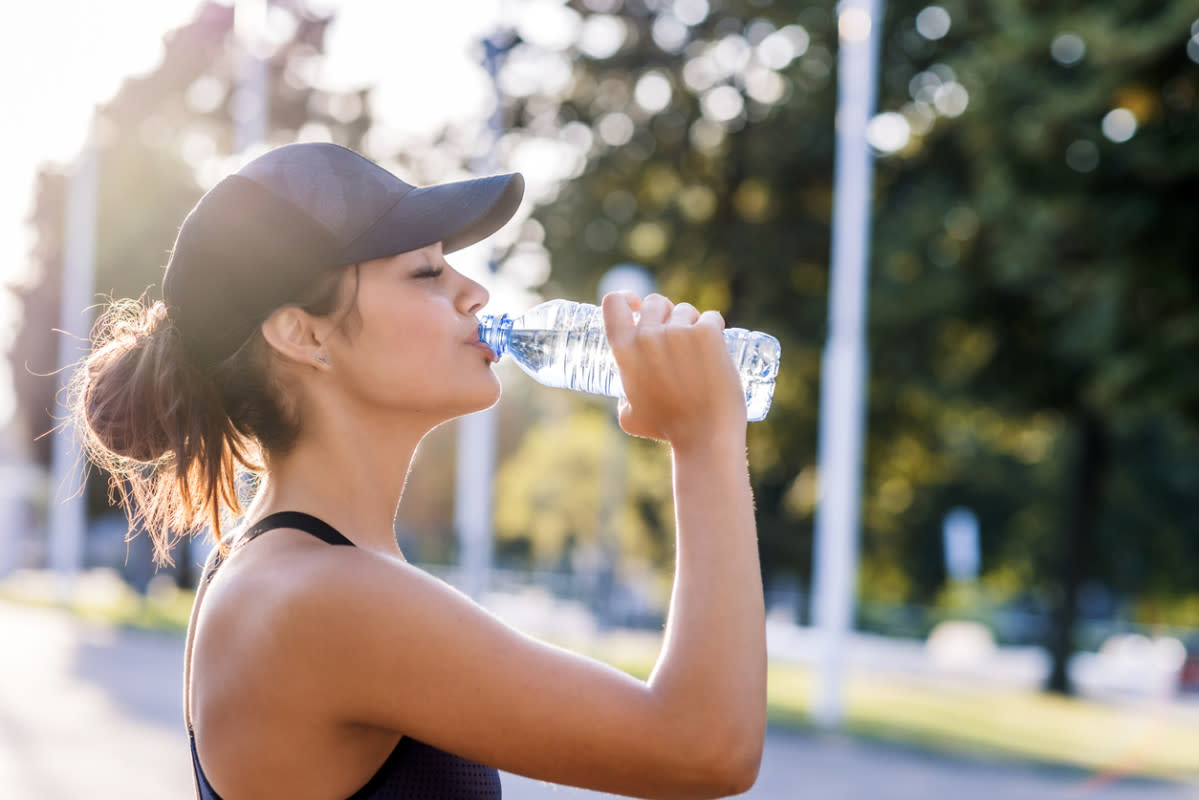This Is the Top Sign You're Not Drinking Enough Water, According to a Primary Care Physician

Woman drinking enough water
Somehow, plain old water has gained TikTok fame in recent years. From gallon water challenges to WaterTok, the best way to stay hydrated has become a slippery slope.
"It is very important to separate fact from fiction," says Dr. Benedict Ifedi, MD, a family and sports medicine physician at Memorial Hermann. "It is possible to overhydrate, which can adversely affect your health as well."
Part of the confusion on precisely how much water to drink comes from the lack of universal guidance on the matter. Unlike specific recommendations on the recommended hours of sleep and exercise we need, there's no standard advice on how much water to drink. The eight 8-ounce glasses guidance is mostly a myth (though it might work for you?).
However, there's a good reason there's no official magic number of water ounces to drink daily.
"There is no one-size-fits-all amount of water that people need," says Dr. Cory Fisher, DO, a family medicine physician at Cleveland Clinic. "Everyone has different and unique water requirements."
Understanding the signs you're drinking enough water can help you determine yours. Doctors shared the biggest sign you're consuming all the water you need and flags your body is raising that you need to drink more (or even less).
Related: Here's How Drinking Enough Water Actually Impacts Weight Loss, According to Registered Dietitians
How Do I Know if I'm Drinking Enough Water?
The primary care doctors we spoke with agree that looking at your pee is one of the best ways to tell if your fluid intake is on point. Sure, it might sound a tad gross, but it's effective.
"If you are urinating pale yellow or clear urine, then you are likely drinking enough water," says Dr. David Cutler, MD, a board-certified family medicine physician at Providence Saint John’s Health Center.
The color of your pee will also tell you if you need to up those ounces. "If your urine is dark or cloudy, you should increase your water intake," Dr. Fisher says.
Dr. Ifedi adds that orange pee with a foul odor is also your body's way of saying, "I need you to fill me up with H2O."
The color (and smell) of your pee isn't the only way you can use urine to determine whether or not you're hydrated. The frequency of your bathroom runs also matters.
"You are drinking enough water if you urinate every few hours during the day," says Dr. Jared Braunstein, DO, a board-certified internist with Medical Offices of Manhattan and contributor to labfinder.com.
Related: Why You Should Sip on a Glass of Water Even When You Don't Feel Thirsty, According to Dietitians
Other Signs You're Well Hydrated
Pee isn't the only sign you drink enough water to keep your body running. "Most people can tell if they have enough fluid if their body can produce fluid such as in saliva, sweat and urine," says Dr. Cutler.
Dr. Ifedi adds that people who consume enough water will notice:
Their skin is elastic
They have good energy and a normal recovery after heavy physical exertion, such as exercise
Normal blood pressure
Normal heart rate
Signs You're Consuming Too Little or Too Much Water
Experts say dehydration is more common than overhydration, but both can happen, so paying attention to your body's cues is essential. "Listen to your body to tell you how much water you need, not people on social media," Dr. Fisher explains.
Dr. Fisher says telltale signs of dehydration include:
Headaches
Elevated heart rate
Muscle cramps
Constipation
While it's challenging to overhydrate, it's possible—and risky. "Overhydration with plain water will dilute the minerals, especially sodium, in your body," Dr. Cutler says. "Low sodium levels in the blood, called hyponatremia, can result in nausea, vomiting, headache and confusion. If hyponatremia becomes more severe, it can lead to drowsiness, irritability, muscle cramps, weakness, seizures, coma and even death."
Related: Is It Better To Drink Water Throughout the Day or All at Once? Registered Dietitians Share the Truth
How to Stay Just the Right Amount of Hydrated
Besides listening to your body, doctors say there are a few top tips for ensuring you get all the water your body needs."Carry a water bottle and refill it throughout the day, and drink water with meals instead of sugary drinks," says Dr. Braunstein.
Sugary drinks may not be the best source of fluids, but that doesn't mean plain water is your only choice. You can stay hydrated with solid foods too.
"Do not discount the other sources from which we may get water that help us meet our fluid needs, such as fruits and vegetables," Dr. Ifedi says.
Next up: 'I'm a Cardiologist—This Is the Afternoon Snack I Eat Almost Every Day'
Sources
Dr. Benedict Ifedi, MD, a family and sports medicine physician at Memorial Hermann
Medical Myths, BMJ.
Dr. Cory Fisher, DO, a family medicine physician at Cleveland Clinic
Dr. David Cutler, MD, a board-certified family medicine physician at Providence Saint John’s Health Center
Dr. Jared Braunstein, DO, a board-certified internist with Medical Offices of Manhattan and contributor to labfinder.com
